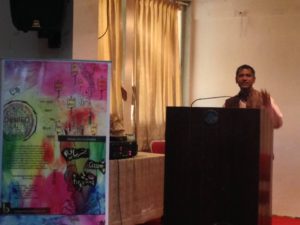
Rahman Abaas at Bebaak Collective
I love my nation, but cannot be forced to blindly follow the policies of a political party. I request each and all to raise this concern in the media and through political platforms to ensure the freedom to criticise the policies of the government.
Rahman Abbas
Mumbai -Recently, Urdu fiction writer Rahmn Abbas was speaking on panel discussion on resisting fundamentalisms, organised by Bebaak Collective .Bebaak Collective is an autonomous women’s group it envisages to capture the diverse voices of resistance and dissent and aims to bring a pause to the onslaughts of hegemonic ideologies which propagates skewed ideas of nation, patriotism, azadi and also womanhood.
A report in the Indian Express quotes NCPUL director Irteza Karim responding to the controversy saying, “If a writer wants financial aid from the government, then of course the content cannot be against (the government)
The NCPUL is an autonomous body under the ministry of human resource development (HRD). One of its major functions is to bulk purchase literary works, and many writers benefit from this as it is difficult for them to find publishers willing to publish their work.
Urdu language, rather unfairly, is being associated with a particular community. Against this background, Urdu writers are aggrieved at the decision of the National Council for Promotion of Urdu Language (NCPUL) to issue an advisory to authors to refrain from criticising the government or any of its policies “in national interest” if they want their books to be approved for bulk purchase under the NCPUL’s monetary assistance scheme.
There are forces against creative expression and there are writers who believe in the freedom of expression and struggle for it. This struggle is very old. However, we also know that in many countries writers have got complete creative freedom. The fight for the freedom of expression will yield result one day, and that day Article 292 will be removed from the IPC or amended. That day writers will breathe in peace as there will be no fear of self-appointed guardians of morality.
Controlling the freedom to criticise the ruling party or government will destroy the fundamental ingredients of democracy, i.e. freedom of speech and the freedom to dissent. It could result in giving unquestionable powers to politicians. Today, the freedom of speech of Urdu writers is being attacked; tomorrow the same practice could, and indeed will be applied to writing in other Indian languages! It is the responsibility of writers working in different languages across the country to take a stand against this move.
Further, it would be wrong to think that criticising the policies of this government is equivalent to being ‘anti-national’. The freedom to discuss or criticise the ruling party is exactly what the opposition enjoys and uses in Parliament. It discusses policies formulated by the ruling party, and if needed, criticises it. Surely, our criticism or critique should be accorded some space, too. No democratic country can ask writers of any one language (read: the language, or languages, of a minority community) to stop criticising government policy.
In fact, it is in the interest of the nation that writers, journalists and all concerned citizens have the freedom to discuss and criticise policies publicly. Moreover, freedom of speech is a fundamental human right guaranteed by our Constitution. Whereas the form introduced by NCPUL goes against the core values that the Constitution of India espouses. It is equivalent to an insult to the creative fraternity of this country. It must be withdrawn immediately.
Leave a Reply